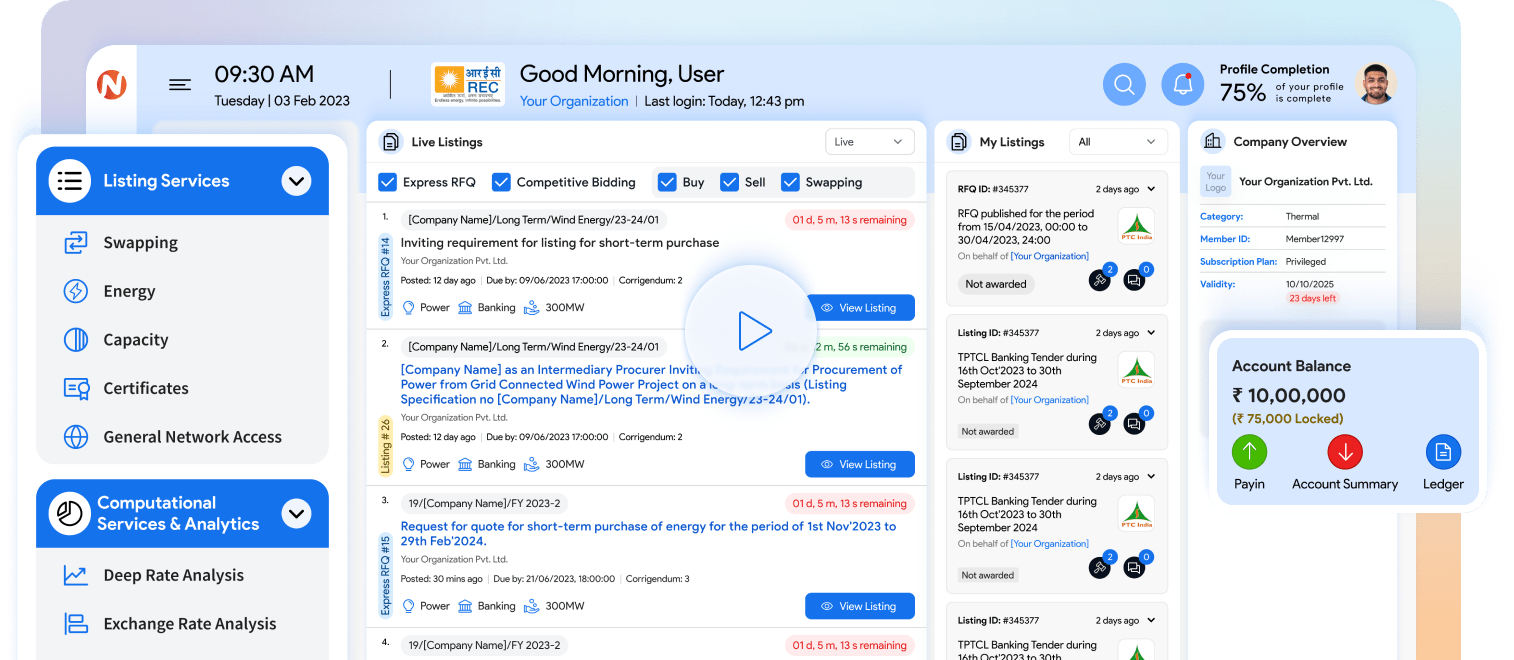About OTC Platform
Sharajman is developing the first OTC platform for power sector in India in line with the Power Market Regulation by CERC (Central Electricity Regulatory Commission). It is an electronic platform for exchanging information among the buyers and sellers of the electricity market. It also maintains a repository of buyers’ and sellers’ data and provides their historical data as a service through advanced data analysis tools.
- 20+ Registered Members
- 70+ Listings This month
- 2 Pan India Mock Sessions
- 24/7 Customer Support
- CERC Approved
- 60+ Users
Features

Membership Management
Automates the management of memberships.
Listing Services
Improves transparency and accountability in the procurement processes

Data Acquisition
Gather, record, store, analyze, and show data from various sources.
Data Analytics
Analyze data in one location.
Take us for a spin!
Qucik Tour

Frequently Asked Questions
The OTC (Over-the-Counter) power trading platform is a digital marketplace where power producers and consumers can conduct bilateral trades of electricity without needing a central exchange. This system allows participants to negotiate terms directly, covering short-term or spot electricity needs. Unlike traditional exchanges, the OTC platform provides greater flexibility and customization for meeting specific power demands, making it ideal for industries and utilities looking for tailored solutions.
The platform is accessible to various participants in the power sector, including utility companies, industrial consumers, state electricity boards, and renewable energy producers. Industrial and commercial consumers, in particular, can benefit by meeting their specific energy demands or offloading excess capacity through flexible transactions. This also applies to smaller renewable producers who may lack easy access to large exchanges but wish to sell their generated power.
Using an OTC platform offers several advantages. Participants have greater flexibility in contract terms, pricing, and duration, allowing for real-time decisions and direct communication between buyer and seller. This can lead to cost savings, as fees associated with centralized exchanges are often lower or eliminated on OTC platforms. Moreover, users gain transparency in pricing, increased efficiency through automated processes, and the ability to secure power as needed, especially in volatile market conditions.
Yes, OTC power trading platforms operate within the regulatory framework set by authorities such as the Central Electricity Regulatory Commission (CERC) in India. These regulations ensure fair trading practices, maintain market integrity, and enforce compliance standards to protect participants. The platform is designed to align with these regulations, enabling users to transact with confidence in a secure and legally compliant environment.
The platform actively supports renewable energy integration by allowing green energy producers to connect with buyers directly. This includes facilitating trades for surplus energy produced from solar, wind, or other renewable sources, contributing to sustainable energy goals. Renewable energy certificates (RECs) or green credits can also be traded, providing additional incentives for producers and assisting buyers in meeting their renewable energy targets.
By offering a competitive, decentralized marketplace, the OTC platform can help reduce electricity costs. With direct negotiation, buyers may find better rates by comparing offers from multiple sellers, while sellers can avoid intermediary fees, allowing them to price competitively. Additionally, users can adjust their power purchase timing based on real-time market rates, potentially lowering costs during off-peak periods or when surplus energy is available.
Security is a primary feature of the OTC platform, often using blockchain or encrypted digital ledgers to securely log transactions. This technology ensures that all trades are transparent, immutable, and traceable, minimizing risks of fraud or data tampering. Additionally, strict access controls and cybersecurity protocols protect sensitive information, allowing participants to trade with confidence in a safe and transparent environment.
Unlike traditional power exchanges that operate with set trading rules and standardized contracts, an OTC platform offers the flexibility of direct, bilateral trades between participants, with customized terms that fit specific needs. While exchanges typically have a central clearing house, OTC trades occur directly between parties, leading to quicker decision-making, negotiable pricing, and adaptable contract structures.
Organizations interested in joining the OTC platform can typically register by completing an application process on the platform’s website. This usually involves providing necessary documentation to verify identity and comply with regulatory requirements, such as proof of business operations, registration numbers, and energy procurement or production licenses. Once approved, participants are onboarded to start trading.
Yes, the OTC platform usually provides dedicated customer support to assist users with any queries or issues that arise. This includes help with the registration process, troubleshooting technical issues, providing guidance on trade execution, and answering questions about compliance. Many platforms also offer support through multiple channels, including phone, email, and live chat, to ensure smooth user experiences.
We redefine the potential of businesses through our extensive market experience
Get more insights into our
products solutions.